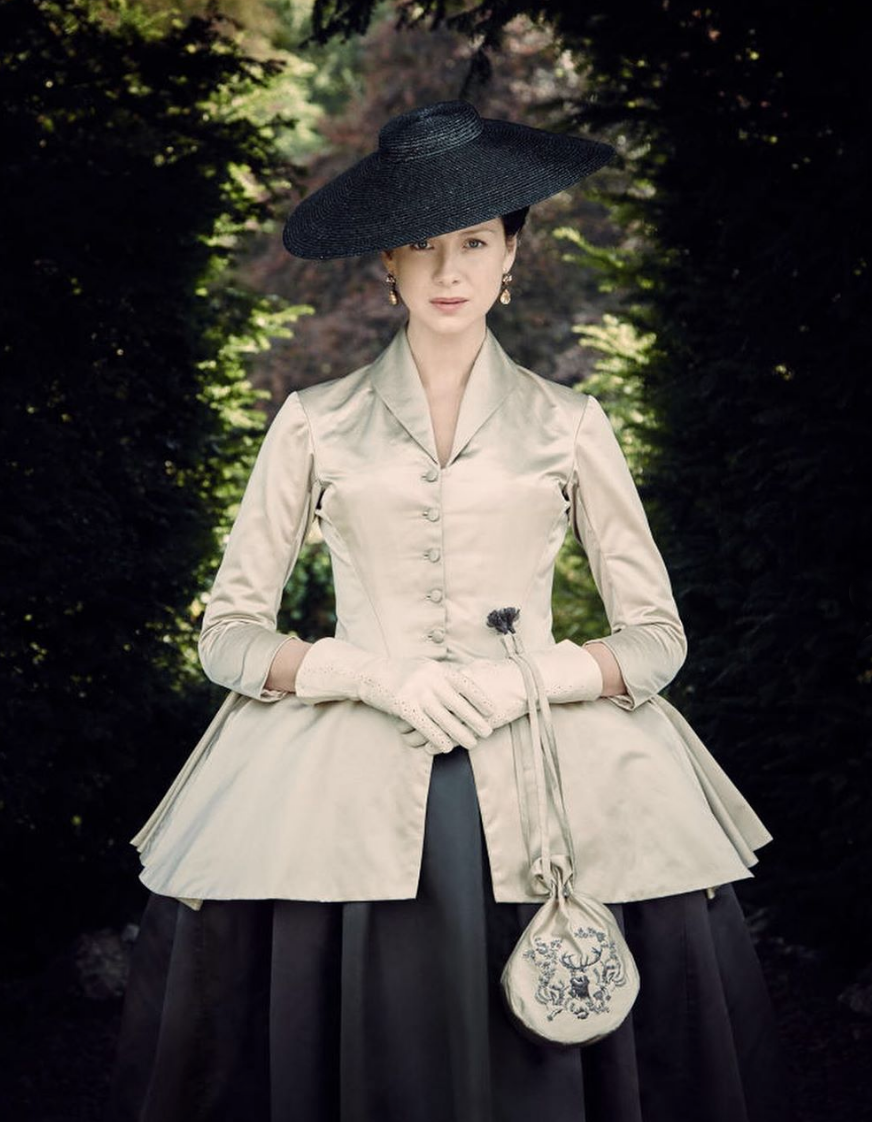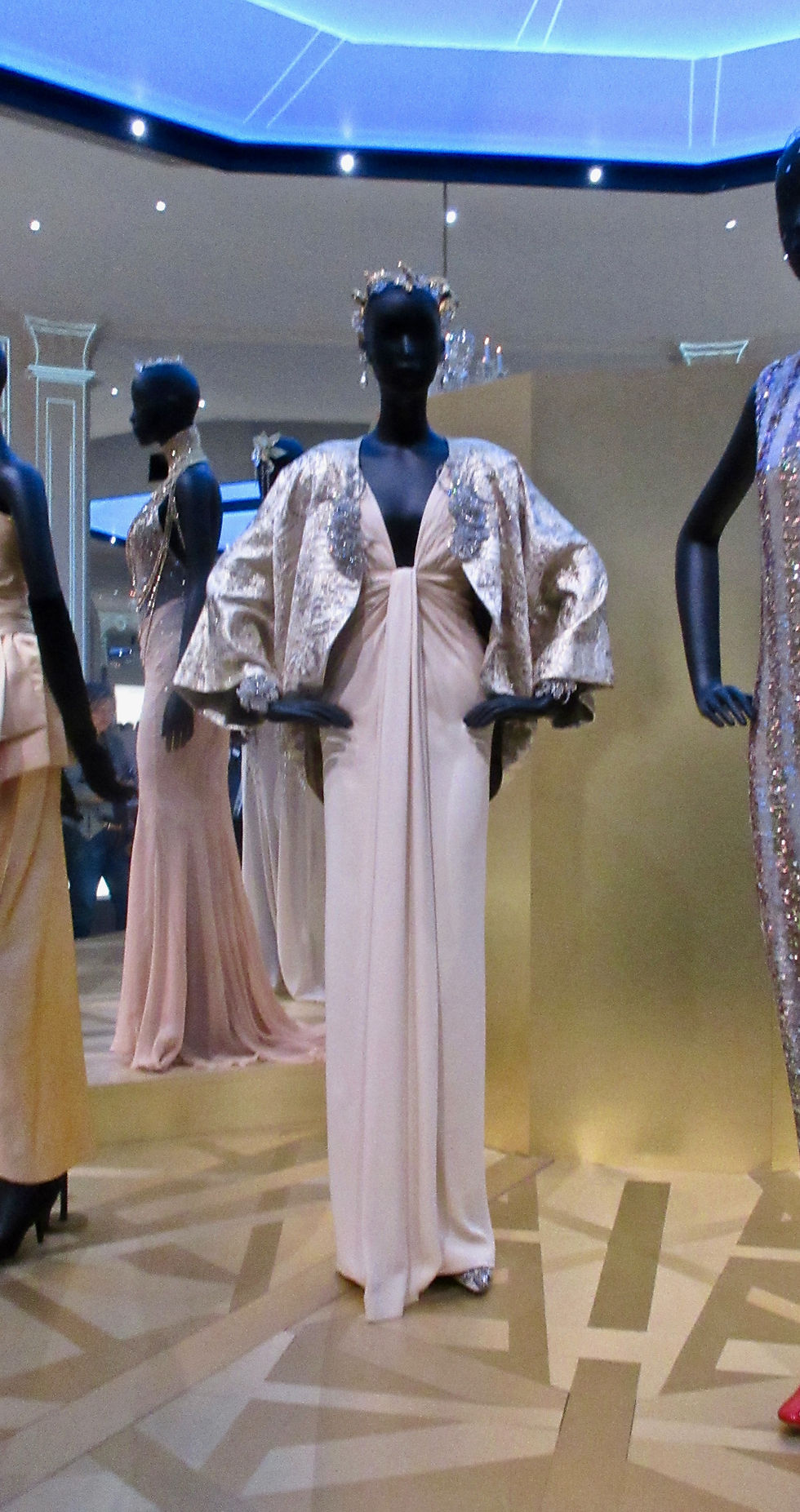Dior. Ooh la la!
- Alison from Mokshatrim
- Sep 23, 2019
- 8 min read
So did you see it???
I left it to the last minute (so me), joined the V&A (feeling very posh) and went twice!
It was so worth it.

I've been reading the Dior autobiography, Dior by Dior, to prepare, which I can heartily recommend.
I was surprised by a few things. I hadn't realised that Dior was so superstitious, relying heavily on fortune tellers. He also kept a lucky star, which he had nearly fallen over on the street in 1946, reading it as THE sign that it was time to start his own fashion house. And so Dior was born.

Dior broke the mold of austerity fashion and the 'make do and mend' of wartime, using bright colours and absolutely extravagant amounts of fabric. After all the war was over and a new and hopeful world was emerging from the ashes and Dior fashion was to be at the forefront.
For fashion, the only way was up, but that wasn't without issue. There were rumours of collaboration of designers with the occupying Nazis. Rationing was also in place and the self indulgence of Dior's designs produced some controversy.
The other detail I found out in the autobiography was Dior's belief that no outfit was complete with out a headpiece or hat. The accessories to Dior's designs were very carefully selected and matched.
That stood out, but was not specifically spelt out, for me in the exhibition. Each design was matched to a hat (though unfortunately not usually the one that it had been initially shown with).
One of the designs which, DID have it's original hat was the eponymous Bar Suit from Dior's first collection in February 1947 dubbed the 'New Look'. This caused such a stir, not just because of the extravagant use of fabric, but also because it was a whole new, figure flattering, glamorous silhouette!


It was great that the fabric, with which the garment was made, was described as it gave my fingers, which were itching to stroke the clothes, at least a texture to imagine!
I'm a bit of a fan of Outlander. Don't know if you've heard of it? They have amazing costumes (and an amazing costume designer Terri Dresbach!). On a recent series they took inspiration from Dior at this time to come up with a variation on these designs that would fit in with costumes in early 18th Century France. For more see Terri Dresbach's blog.

Any hooo, back to Dior!
The exhibition was laid out as beautifully as the garments, but even though I was expecting (or maybe hoping for) mostly classic original Christian Dior designs, garments from later Dior designers were also intermingled.
It was often hard to recognise the differences. The earlier designs did not look particularly dated.
Some later designers stood out. Galliano's pieces for example, being so much more avant garde!
As I progressed through the exhibition, I began to recognise some features, styles and silhouettes of the different Dior designers.


The other feature I associate with Dior, other than clean classic lines, is attention to detail. The detail of crystals, embroidery, feathers, thread work, and creation of new textiles, which is usually done in house.
This Raf Simons dress, for example, seems to be made up of thousands of guipure lace appliques applied to silk organza.


I also love the tricks used. Making something look like one thing, but then close up you see it is something else entirely.
Like this beautiful dress below. At first glance it is made up of flowers.

But then close up it is clearly feathers.

Christian Dior was clearly enamoured with the UK, with fashion shows at the Savoy (with funds helping set up the UK's first Fashion Museum) and Blenheim Palace and built up a friendship with our glamorous and beautiful Princess Margaret, designing the dress for her 21st birthday.


Going back to the history of the Dior house, and running a small business myself, I was AMAZED at how fast the company had expanded.
Launching perfumes in 1948 (Year 2)
Opening their first boutique in New York in 1949 (Year 3)
Starting C.D. Models opening in London in 1952 to manufacture designs for Britain and Commonwealth countries (Year 7)
By the end of 1953, the company had operations in Mexico, Canada, Cuba, and Italy (Year 8)*
This was mostly due to demand for Dior clothes abroad.
In the UK this had initially been satisfied by UK clothing manufacturers producing authorised copies.
The International nature of Dior was highlighted by the exhibit of worldwide influenced designs, showing a twist on traditional ethnic influences. I think this was one of my favourite bits of the exhibition.
Items from Galliano's ancient Egyptian influenced collection in Spring Summer 2014, were typically extravagant and over the top, but also colourful and striking.


Maria Grazia Chuiri's Cruise 2019 collection, was influenced by the Adelitas, female soldiers of the Mexican revolution of 1910-20. To represent this, her fashion show featured escaramuzas, fearless female horseriders, wearing the outfit below and performing complex choreography. It's worth checking out this article for more!

Isn't the cotton lace work fabulous!

Galliano wasn't the first Dior designer to be inspired by Ancient Egypt. I loved the Marc Bolan design from Spring/Summer 1968 below, because it managed somehow to be incredibly sparkly but not over the top.


I love India. So this Gianfranco Ferrere Autumn/Winter 1996 dress, with a clever twist on the sari, was always going to appeal.


Another Galliano, this design below is from his Autumn/Winter 1998 collection, is inspired by China.
The most striking part of this design is the amazing necklace, inspired by the handmade silver jewellery of the Miao women of south west China, who literally wear their wealth for special occasions like marriages.

The dress (below) echoes the textiles and pleating used in a traditional Han Chinese qun skirt.

The dress below, another Galliano, was breathtaking! One of my favourites of the whole exhibition. (Sorry the image is blurred!)
The design is based on the traditional embroidered and fringed Chinese shawl, which was exported to Europe.
I loved the colour, the bias draping, the train and the incredibly clever use of the fringing. Stunning! In fact it felt very un-Galliano!

And a final Chinese Galliano, his version of the cheongsam from Autumn/Winter 1997 of stretch silk damask.

Moving onto Japan, below, this gorgeous soft romantic tulle dress has classic trailing cherry blossom, from Maria Grazia Chiuri's Spring Summer Collection 2017.


I'm a bit of a sucker for a bit of sparkle and my did this Galliano design sparkle!! (see below).
Influenced by the headpieces of the Maasai, crossed with a bit of flapper girl, with pieces of Sevre porcelain thrown in for good measure, this piece was more about the jewellery for me than the outfit.


The exhibition reflected Dior's love of flowers and the garden, with a room of designs decorated with the most amazing, beautiful paper flowers, which came alive with special lighting. They feature a number of flowers including wisteria clematis, roses and Christian Dior's favorite flower - lily of the valley. The flowers were created by Wanda Barcelona, who has been working with Dior exhibitions since 2012. For more.
It's hard to comprehend how effective they are in these photos!


You can see them being added to the original exhibition in Paris in the video below.
It's hardly surprising that flowers influenced Dior's original designs. In his autobiography, Dior by Dior, Dior describes the creative process of a collection.
The design process is tried and tested - but it is clearly a lengthy process.
He retires to the country for a couple of months. He totally switches off for a few weeks. Then starts a period of frantic sketching.
The sketches are whittled and single sketches are transformed into a series of several hundred designs called petites gravures.
On return to Paris these designs are shared and the ideas elaborated on with his trio of trusty advisors;
Madame Raymonde, Director of Design who Dior described as "reason to my fantasy, order to my imagination, discipline to my freedom"
Madame Marguerite, Technical Director, who made the designs work
Madame Bricart, Head of Millinery - but more importantly Dior's Muse.
and then passed to the Premiers of the workrooms to take the design and bring it to life in a canvas toile.
The exhibition showcases this process beautifully with a stark room full of toiles, which seem to go on forever due to a cleverly mirrored ceiling.

In the design process the toiles are shown several times. Some designs evolve and are matched to models (known as mannequins), some are cut.
The chosen toiles are matched to the fabrics, which will have been selected two months previously and the designs are made up. This is the first showing and the designs are now known as models.
The evolving and whittling process of the toiles is repeated with changes in fitting and proportion.
The second showing is in the Salon where the show will be held, to see how they will look and the impression they will make.
Chosen designs are matched with a a suitable hat. They may give birth to several versions inspired by the original design. Other designs may be cut.
Finally there is a dress rehearsal, three days before the opening show, with artists who sketch the models. There are still tweaks, accessories such as jewellery and furs are added.
It all seems rather exhausting!
The exhibition illustrates both toiles, final outfits and their mini versions. There is also an array of accessories, all are exquisite.


Like these amazing embroidered gloves from Raf Simons Spring/Summer 2013

Some of the accessories were quite bewildering. Like these John Galliano knee pads.

Or these amazing but also slightly disturbing shoes from Maria Grazia Chiuri.

The piece de resistance of the exhibition was the evening dresses.
The room was an assault on the senses. It took two visits to fully appreciate the detail in the room.

It told an amazing story. For me it was all about getting ready and having a luxurious night out.
First muted lighting, which slowly changed. Then the orchestra started to tune up and there was chatter, like people were congregating for a special occasion.
In every phase the lighting changed and new features appeared on the walls and ceiling, just like magic.
Slowly the lights dimmed as the evening progressed. The night sky appeared and the stars came out with beautiful shooting stars.
The constellations were traced in the sky.
Then slowly the sun rose as dawn came as it would after an epic night out and slowly the cycle started again.
The dresses were all more beautiful than the previous.
My favourites are below.
As usual John Galliano's sense of the dramatic and controversial, with this piece from 2009.


And the gorgeous balletic shape of this Galliano from 1998.

The photo doesn't do justice to this elegant design by Gianfranco Ferrere from 1990.

There is something very innocent and simple about this silver thread dress from Maria Grazia Chiuri 2017.

I challenge you to think this gorgeous beaded original Dior dress from 1952, below, is dated. It looks so modern! In fact having seen a bodice by Raf Simmons earlier in the exhibition (see beneath), I had assumed it was one of his designs.


The three dresses used in the J'Adore Dior perfume commercials and worn by the model, Charlize Theron, were on display. My favourite was the original one by Galliano from 2008.

A couldn't resist both the sparkle and the shear tribal vibe of this design, also by Galliano (quelle surprise - clearly he is my favourite!).


The dress below, I originally thought was classic vintage Christian Dior due to it's gorgeous simplicity, classic Dior shape and clean lines.
I was shocked to discover it was actually Bespoke Maria Grazia Chiuri worn by Rhianna at Canne in May 2017. No doubt inspired by the original Dior silhouette.

Despite the early and sudden death of Dior on 25th Oct 1957, Dior's subsequent designers have clearly followed the essence of Dior.
Yves Saint Laurent 1957-60 had been Dior's assistant and was just 21 when he took over. He totally changed the Dior silhouette to the more sleek, skimming Trapeze Line. His designs are very recognisable.

When Laurent was called up for National Service Marc Bohan 1961-89 took over, with his sculpted silhouettes.
Gianfranco Ferrere 1989-96 brought in new textiles to the house of Dior and a sense of the dramatic.

John Galliano 1996 -2011 took the sense of drama to a new level drawing inspiration from travels around the world. Sadly in 2011 he was removed over scandalous Anti Semetic remarks.
Raf Simons 2012 - 15, who was ironically Jewish, as a master of minimalism with was a departure from the flamboyance of recent years. He was a master of tailoring and details and his funkier designs appealed to a younger Dior audience.

Maria Grazia Chiuri 2016 - present is the latest Dior designer and first woman to design for Dior. She has a strong feminist voice but her designs are soft and romantic as can be seen in the beautiful dress below.

I'm going to conclude with my favourite design from the whole exhibition, which made my heart sing. And oddly it's Yves Saint Laurent, in a gorgeous 3D guipure lace and the dress, timeless!


I hope you enjoyed my impression of Dior: Designer of Dreams. Watch out for my next post on Weavers of the Clouds: Textile Arts of Peru.





















Comments